- Home
- Tim LaHaye
The Rising: Antichrist is Born / Before They Were Left Behind Page 6
The Rising: Antichrist is Born / Before They Were Left Behind Read online
Page 6
Once Marilena had studied her fellow riders on the bus home from the university and realized she looked more like a domestic working woman than a professional. Should she change her look? Why? What did she care what people thought? To judge someone on appearances was petty. And she had just done it herself. She believed she knew who the maids and manual laborers were. Just because they did not carry briefcases or book bags like she did, how could she be sure? Nothing else, save what she read as she sat there, gave any clues to her profession.
But at that second Tuesday night meeting, Marilena was strangely warmed by the small talk. No one was personal or probing. They didn’t seem to care any more than she did to ask about family or work or interests. They merely maintained eye contact, smiled, shook hands warmly, and welcomed her back as if they were truly glad to see her again.
Hadn’t that been a part of uneducated society that had repulsed her? Idle chatter. Feigned enthusiasm. Yet these people seemed genuine. And why? Because she needed them to be? Because her marriage had deteriorated, settled into mere intellectual companionship? Or was it possible that one or more of these people could become friends? Might their weekly relationships blossom? The ones who seemed to have been there from the beginning appeared to have bonded. Some greeted each other with actual embraces.
Too much familiarity too soon had long been one of Marilena’s pet peeves. Too much touching, too many personal questions, the overuse of first names. Yet now she found herself envious of these people who, though their only connection was likely this weekly meeting, seemed to consider each other family.
It wasn’t that Marilena didn’t have friends. She did. Not conventionally, not like the ones she read about. There was no one she confided in. But she had colleagues in her department, and because the psychology faculty shared the same building as she and her lit associates, she had come to know many of them on a first-name basis. She and Sorin entertained four to six people at a time in their apartment approximately once a month, always a slightly different mix. Sorin had one or two friends who seemed closer than any she had developed—his vice-chair for one—but as the chair, Sorin had to remain a bit detached too.
Detached. That was a kind way to think of Marilena’s relationship with her colleagues. While they seemed to respect and even admire her, none were close. Some were close with each other, recounting outings, dinners, and concerts together. She had never been invited and, she told herself, didn’t really care to go. It wasn’t true, of course, but the lie was easy to believe because she overwhelmed it with her own private pursuits in the form of books and disks in which she could lose herself for hours every evening.
Early in their marriage, when she considered Sorin more a soul mate than the roommate he had become, she had once broached the subject of her “otherness” as it related to colleagues. “Well,” he had said, puffing one of his many pipes, “you don’t invite them anywhere either. Try it. They might accept. And they would likely reciprocate.”
She never had. But this need for a child—she was finally comfortable admitting to herself that that’s what it was—might be softening her edges to where she also longed for conventional friendships. In fact, she wondered, might one or two meaningful connections with adults dull her pain?
Marilena had sat in the back next to her sulking husband. When Viviana Ivinisova began her routine, Sorin never even looked up. And when it came time for the darkness and the candle, Marilena could tell he was dozing.
She herself was more skeptical that second meeting, fighting to detect generalizations and tricks as Ms. Ivinisova told the past, predicted the future, and seemed to read minds. Sitting in the back proved propitious, as Marilena was able to read body language and group dynamics. People were buying this, no doubt. But she steeled herself against being swayed as she had been the week before.
Until Viviana caught her eye.
Was it just Marilena’s imagination, or was Viviana returning her gaze every few moments? The woman didn’t appear to look at anyone else. Oh, she faked it. People in the second or third row likely thought Viviana was looking directly at someone in the fourth or fifth row or farther back. But Marilena could tell that she was looking between people and at the back wall, sometimes at the ceiling.
That was not unusual for teachers and public speakers. Marilena had been taught that a professor was supposed to maintain eye contact with various students. But she happened to be one who found that disconcerting and distracting, so she faked it.
Viviana appeared largely to be faking it too, except when she greeted newcomers or interacted with someone who admitted that he or she had gotten a message from the great beyond about them personally. And when she looked directly into Marilena’s eyes.
She kept trying to tell herself she was imagining it, that being eight rows back she couldn’t really know. But she could. Did Viviana detect Marilena’s skepticism, or was she trying to reach her because it was obvious her husband was a lost cause? Did the woman see something in Marilena?
“In the remaining moments,” Viviana said, “I have two messages to convey.” First she spoke for more than five minutes on misconceptions about the spirit world, concluding, “Many of you are familiar with the Bible and what it says about clairvoyance, fortune-telling, and evil spirits. I merely want to remind you that this represents only one view and is, in my opinion, neither valid nor representative of the majority of the best thinking on the subject. For our purposes, we must remain open to the views of most spiritually sensitive people. We believe that while there are negative spirits, not all should be considered enemies of God. And—and I beg your indulgence to think this through if you happen to be a believer in God and that the Bible is His message to mankind—it does not necessarily hold that opposing God is sin.”
Marilena had no idea how many in the room might be people of faith. Romania, she knew from history, had been swept through eons of varying views on the subject of God. From paganism through Catholicism to Orthodoxy to the atheism attendant with Communist rule, the nation seemed to have settled into a secular humanism that tolerated pockets of quaint and ancient churches of varying stripes. Regardless of where someone stood on belief in God, most had at least a cursory understanding of religious teachings. God was the supreme being—benevolent or judgmental depending on your denominational preference—and His adversary was the devil.
Now Viviana Ivinisova seemed to be asking that everyone, regardless of their religious beliefs or lack thereof, consider an alternative. “I’ll get deeper into this in the coming weeks,” she said. “But for now, allow yourself to consider that if there is a God, it would be to His advantage to make a sinner out of someone who threatens Him. Especially if that opponent happened to be right. Maybe it is not a sin to presume upon God’s exclusive right to preeminence. I know that is a revolutionary concept, so mull it over and keep an open mind for when we get back to it.
“Meanwhile, I have a specific message from a cooperative attending spirit. If it applies to you, accept it for what it is.”
Marilena was convinced Viviana glanced directly at her again before sitting at her table and pressing her fingers to her temples.
“Daughter,” she said softly, then briefly raised her head with a smile, as if surprised. “So we know this message is for a female.” She lowered her head again. “Daughter, you need not seek a substitute solution. Your longing cannot be assuaged by contemporaries. You need what you need, and that need will be filled.”
Ray Steele listened more intently in Sunday school and church. He asked questions of his Sunday school teacher that seemed to rattle her. Ray raised the questions his father had about the God of the Old Testament, who seemed judgmental and fearsome.
“I . . . uh . . . I’m certainly not an expert on the Old Testament,” Mrs. Knuth had said. “Our quarterly lessons are on New Testament stories and parables, so maybe you should save those questions for—”
“Well, but I was just wondering. I mean, what do you think? Does that
sound fair? Does that sound like a loving God?”
“I really need to get back to the lesson, Ray. We have a lot to cover in a short time. Okay?”
Ray found the pastor’s sermons just as confusing. He seemed to preach only from the New Testament, and he used the stories and accounts as jumping-off places to support his points. And his point usually was that “believers in Christianity ought to exemplify godly virtues in this world.”
That was fine with Ray, except that if God was God and God was perfect and God was love, what about all that ugly stuff in the Old Testament? If Ray was a “believer in Christianity”—and he was starting to wonder if he really was or if he had just been dragged to church all his life—was one of those godly virtues murdering people who disagreed?
At Sunday dinner Ray raised the question, and as usual, his dad tried to give the final answer. “Look, Ray, your mother believes I shouldn’t have gotten into all that with you the other day, and I have to say she’s probably right. At your age you don’t need to be thinking about the major issues of life and God and all that.”
“But I just want to know—”
“I know you do, but listen, I was born and raised a Christian, and I don’t understand it all. All we can do is the best we can and try to be good people. Respect other people. Don’t talk politics or religion with them. I mean, you’d rather be a good person than a bad one, right?”
“’Course.”
“And you are a good person, Rayford,” his mother said.
“And that’s all you need to worry about,” his dad said. “Some stuff just isn’t for us to know.”
“This side of heaven,” his mother said.
Sorin absolutely refused to go to another Tuesday night meeting, and he expressed shock that Marilena wasn’t “over this silly pursuit. Surely you’re not swayed by this woman.”
“Of course not,” she said, feeling like a liar. All the way home that evening, as Sorin crowed about having fulfilled his obligation, she had labored to convince herself that the message Viviana had shared could not have been for her.
It could have been for anyone. Again, no specifics. A dozen others could have applied it to their own situation.
Yet had she not, just moments before the message, been wondering whether friendships with colleagues or even people from this class might fill the need she saw no other way to fill?
FIVE
THE LE HAVRE meeting was held at a clandestine villa belonging to one of the secret council, and no one—not a friend, a spouse, or a blood brother—even knew it was taking place, let alone what transpired there. Mr. S. ran the meeting, which was brief and to the point. Powerful men of finance and commerce from around the globe swore themselves anew to common goals, to confidentiality, and to Project People’s Victory.
Ten Tuesday nights later Marilena sat in her apartment, dozing. Footsteps in the hall roused her. She did not want Sorin to find her in the dark, so she rose quickly, dizzying herself, to turn on a light as she heard him at the door.
“Just get home?” he said. “The place looked dark from the street.”
She nodded. Lying to him had become the norm. But what was the difference? His being gone and apparently feeling no compulsion to explain was a lie of omission, was it not? The way he studied her made her wonder if her countenance gave her away. The walk to the bus and the discussion with Viviana had shaken her.
“Any more messages from beyond?” he said, hanging his coat and pulling a beer from the refrigerator.
“Every week,” she said, playing to him.
“And what was it this time? ‘Someone is feeling regret over a childhood memory’?”
“Yes,” she said. “Something like that.”
As he turned on more lights and began puttering at his desk, she sat back down in her chair, causing him to ask if she was all right.
“I wouldn’t mind a talk if it is all right with you.”
“A talk?” He sat on the edge of his desk and gazed at her. “As long as you’re not about to tell me you’ve contacted the netherworld.”
“You know better than that.”
“How long is this going to take?”
“Honestly, Sorin, if you don’t have time to talk with me—”
“I’m just asking, dear. I have a big day tomorrow and a little more work to do, so—”
“Then just forget it.”
“I don’t want to forget it. I simply want to get an idea whether I’ll have time to finish my work tonight or have to get up earlier.”
She shook her head.
“I see,” he said. “You want me to coax it from you.”
“I want nothing of the sort. If you are so busy and have so much to do, where have you been?”
He moved to his desk chair. “Since when do you ask me where I’ve been?”
“When you complain of being too busy to talk with me.”
She hadn’t expected it, but that seemed to leave him speechless. For once. Marilena had certainly learned the folly of arguing with him. No contest.
Now he sat straightening things on his desk. Finally he said, “Well, if nothing else, you have roused my curiosity.”
“Forget it, Sorin.”
“No. I apologize. You have my full attention for as long as you need it.” When she simply stared at him, he continued. “I’m serious, Marilena. You’re right. You’re not asking for too much, and I am on pace with my work, so please . . .”
“Then promise you’ll hear me out.”
“I believe I just did.”
“Sorin, I know this is going to come as a shock to you as much as it has to me. Believe me, it is not a passing fancy but something that has been weighing on me for months. I have tried to fight it, tried to talk myself out of it, and determined to keep it from you.”
His brow knotted. She certainly had his attention.
“I want to talk to you about it, and I don’t want you to get upset or defensive.”
He leaned back in his chair. “I know,” he said.
“You know?”
He nodded. “It’s been written all over you for a long time.”
“It shows?”
“Of course. I know you, Marilena. I know we don’t have a conventional marriage, but you have to recognize that our minds often seem like one.”
“Often.”
“So it shouldn’t surprise you that I know what you’re thinking. Even more than your favorite fortune-teller.”
“She’s not a—”
“I’m teasing, Marilena. I’m just saying that I know.”
“And so?”
“And so you want to know if there is someone else.”
Marilena fought a smile. The great intellect thought he knew so much, knew her so well. In fact, while she was curious, that had been the last thing on her mind. Of course there was someone else. Sorin was a man, wasn’t he? He was sleeping with someone, and frankly, that was more than all right with her. It took the pressure off her, and she did not desire him that way. Never had.
Curious who it was? Sure. She had speculated it might not be just one. It could have been several women. Maybe he was a grazer, a bar hopper, a one-night stander. She didn’t care. It made her resolve never to let her guard down, never to give in if he pressured her for romance. Who knew what disease he might bring to bed?
Was he about to tell her? Would it be someone she knew? Marilena had never suspected anyone from the university. He had to be smarter than that. She had detected nothing between him and anyone there.
“Okay,” she said carefully. “Do you need me to ask?”
“No,” he said. “You deserve to know. It’s time you knew. It’s Baduna.”
“What? Baduna! But, you, I—Baduna Marius?”
“Don’t worry,” Sorin said. “I won’t leave you for him. I can’t. He’s married, and happily, believe it or not.”
“But I—”
“And he is not willing to come out.”
Marilena closed her eyes a
nd shook her head. “And you are?”
“Am I what?”
“Willing to come out?”
“Who do you think doesn’t know about me, Marilena?”
“Well, I for one!”
“Come now. Please.”
“I didn’t know!”
“Marilena! Why do you think my children will have nothing to do with me? Why do you think I was divorced? Why do you think I have shown little interest in—?”
“I didn’t know.”
“Well, now you do. Frankly, I’m relieved. Maybe now I can simply tell you, ‘I’m off to see Baduna.’ Maybe I can even be gone overnight occasionally. I need not remind you that no one knows about him.”
“Don’t worry. I barely know his wife.”
Ray Steele began to be more difficult and vocal at home. He was sarcastic and sassy, and even he hated the way he sounded and acted. Sunday school and church seemed meaningless and boring now, and while he had a few friends there, he fought going. His dad laid down the law: Ray was going and that was that. But Ray hated it, acted up in class, doodled and read in church. None of it made sense to him anymore, so he simply tuned it all out.
So it wasn’t her. Marilena was living with a brilliant scholar who happened to be a homosexual. She tried to imagine his life had he been born a few generations earlier. Tolerance had come slowly to Romania, especially in the area of sexual preference.
So much for admitting to him that she longed for a child and wondering if he would ever consider changing his mind about giving her one. Had she discovered that he had had a bevy of female companions—and knowing that he had apparently lost interest in her sexually long before—she had planned to ask him to simply be a sperm donor anyway. She certainly didn’t want to subject him to anything as distasteful as sleeping with her. And now that went double.
What could she do now? Find a man? Have an affair? Marilena certainly felt justified, but she had to admit there had been times when she wondered if she herself was a homosexual. She couldn’t imagine it, because she had never felt attracted to a woman that way. But neither was she attracted to men, except to Sorin because of his mind. Finally, in her reading, she hit upon the perfect description of herself. She decided she was asexual.

 Glorious Appearing: The End of Days
Glorious Appearing: The End of Days Left Behind: A Novel of the Earth's Last Days
Left Behind: A Novel of the Earth's Last Days Kingdom Come: The Final Victory
Kingdom Come: The Final Victory Nicolae: The Rise of Antichrist
Nicolae: The Rise of Antichrist Desecration: Antichrist Takes the Throne
Desecration: Antichrist Takes the Throne Mark's Story: The Gospel According to Peter
Mark's Story: The Gospel According to Peter Babylon Rising
Babylon Rising Thunder of Heaven: A Joshua Jordan Novel
Thunder of Heaven: A Joshua Jordan Novel The Edge of Darkness
The Edge of Darkness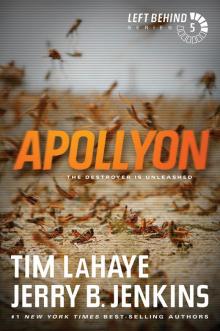 Apollyon: The Destroyer Is Unleashed
Apollyon: The Destroyer Is Unleashed Armageddon: The Cosmic Battle of the Ages
Armageddon: The Cosmic Battle of the Ages Soul Harvest: The World Takes Sides
Soul Harvest: The World Takes Sides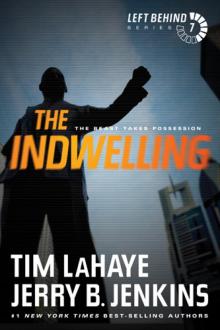 The Indwelling: The Beast Takes Possession
The Indwelling: The Beast Takes Possession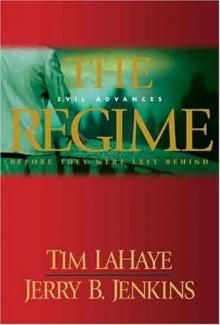 The Regime: Evil Advances
The Regime: Evil Advances The Rapture: In the Twinkling of an Eye / Countdown to the Earth's Last Days
The Rapture: In the Twinkling of an Eye / Countdown to the Earth's Last Days The Remnant: On the Brink of Armageddon
The Remnant: On the Brink of Armageddon John's Story: The Last Eyewitness
John's Story: The Last Eyewitness The Europa Conspiracy
The Europa Conspiracy Mark of Evil
Mark of Evil Brink of Chaos
Brink of Chaos The Mark: The Beast Rules the World
The Mark: The Beast Rules the World 04 The Edge of Darkness
04 The Edge of Darkness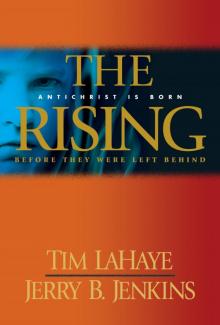 The Rising: Antichrist is Born / Before They Were Left Behind
The Rising: Antichrist is Born / Before They Were Left Behind Babylon Rising: The Edge of Darkness
Babylon Rising: The Edge of Darkness 03 The Europa Conspiracy
03 The Europa Conspiracy Desecration
Desecration Left Behind
Left Behind The Remnant
The Remnant Soul Harvest
Soul Harvest Left Behind Book 13: Kingdom Come The Final Victory
Left Behind Book 13: Kingdom Come The Final Victory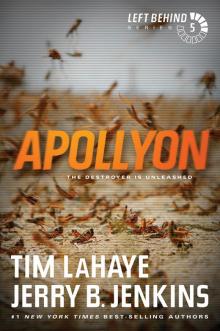 Apollyon
Apollyon 02 Thunder of Heaven: A Joshua Jordan Novel
02 Thunder of Heaven: A Joshua Jordan Novel Glorious Appearing
Glorious Appearing The Rapture: Evil Advances / Before They Were Left Behind
The Rapture: Evil Advances / Before They Were Left Behind Edge of Apocalypse
Edge of Apocalypse Tribulation Force
Tribulation Force The Left Behind Collection: All 12 Books
The Left Behind Collection: All 12 Books Black Friday
Black Friday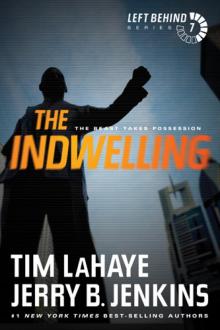 The Indwelling
The Indwelling The Left Behind Collection
The Left Behind Collection